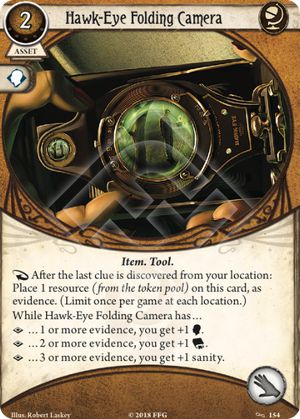In a number of ways, this suffers from the same problems a number of assets do: the Hawk-Eye Folding Camera becomes a less useful investment for every turn the game lasts, because of the slow buildup.
If you have it fully powered up, it's not a bad package deal: +1 , +1 , and +1 sanity is about the same as St. Hubert's Key, at half the price.
But most seekers don't really benefit from said package deal. Between naturally high sanity pools, a surplus of allies with decent sanity soak like Dr. Milan Christopher, Charles Ross, Esq., Dr. William T. Maleson, and Mr. "Rook", and Higher Education, they can afford to take most tests on the chin, and spend their way past everything else. So, in practice, what they really want is that +1 .
How long does it take said +1 to come online? Well, to some extent, you can cheat around the condition. If you play it when a location has 1 clue on it, clear that clue, Pathfinder over to another location with 1 clue on it, then clear that location too, you could theoretically do it in three actions. However,this is both unlikely, and is discounting the prior effort involved in discovering clues at said location.
A more useful measure might be "how many investigate tests will this card help me with, if I play it the second I draw it?" The best measure for that would be the act deck. The number of clues needed in a given scenario tends to hover at around 5 to 6 clues. In turn, the minimum number of clues at a location is usually 1. That means if this is played in your opening hand, it will only help you for 2/3rds of the game. And if you draw it, say, halfway through, it'll only help you on the last 1 checks.
Let's compare with the venerable Magnifying Glass. Sure, you only get the +1 if investigating. But the list of things a raw boost helps with besides an investigate is actually pretty small, consisting of the following:
- "I've got a plan!".
- Hypnotic Therapy
- False Lead
- Lost Soul (sometimes)
- The occasional Parley option on enemies.
Most of these are rare enough that you can afford to commit to them instead, or pay your college debts to make them go away. And Magnifying Glass is fast, cheaper, and provides that key bonus to investigation attempts right away. Even if you draw it on turn 14, and there's two clues left to discover before the last act advances, it will still help you for those two clues.
For most seekers, the Magnifying Glass is a superior option, which competes for the same hand slots. In order to really make good use of this camera, that +1 boost needs to be meaningful, because it's the one that turns on first, and the one that offers a niche over other cards that would boost now instead of later. So, who wants it?
- Daisy Walker can use it for spells. But her hand slots are already highly contested by books and other tools, to the point where even Magnifying Glass doesn't always make the cut.
- Marie Lambeau has the right statline and cardpool to make use of it. But she also has in-class access to St. Hubert's Key, and with only 5 off-class cards to work, a card that duplicates benefits already available from other cards isn't high on the priority list.
- Carolyn Fern can also use it for spells, and likes the boost for Hypnotic Therapy. But she only has 3 base and no access to the 3+ XP spells or Spirit Athame. She's not going to be good enough at it, because she needs 3 or more boosting assets in play to have a reliable baseline.
Now, I'd say the one investigator who really likes this card is Norman Withers.
- His awkward card pool, with only 5 level 0 cards, sharply limits his access to the cards that would make this card redundant.
- His special ability heavily discourages skill cards in his deckbuilding, making him more reliant on consistent stat boosts.
- With his choice of XP cards being instead of , that +1 gets used for everything, instead of just treacheries.
In short, this card tends to be overshadowed by Magnifying Glass for pure seekers, while competing for highly contested slots in either deckbuilding or play area in other investigators.
